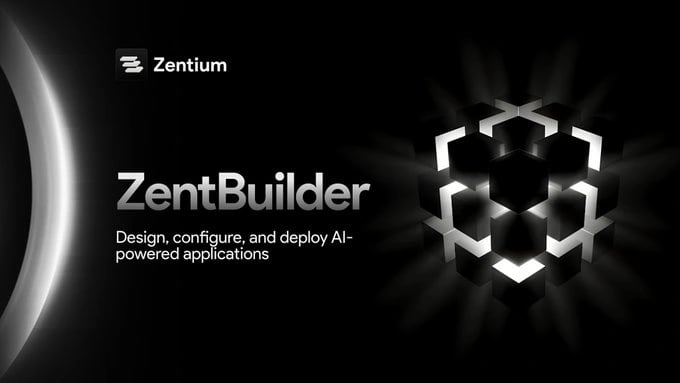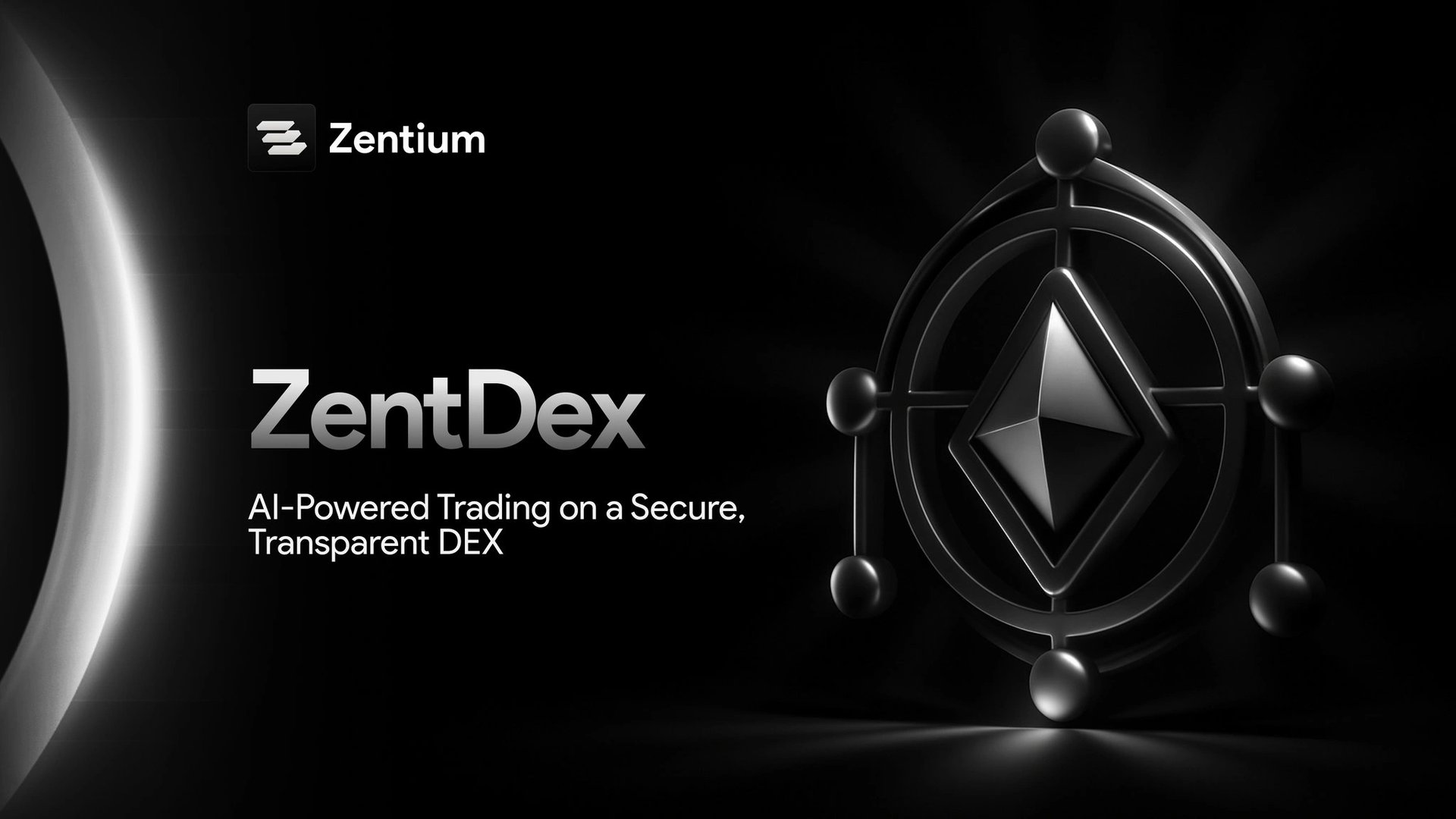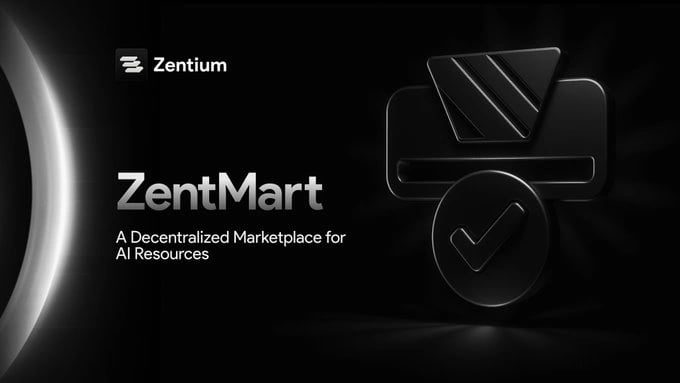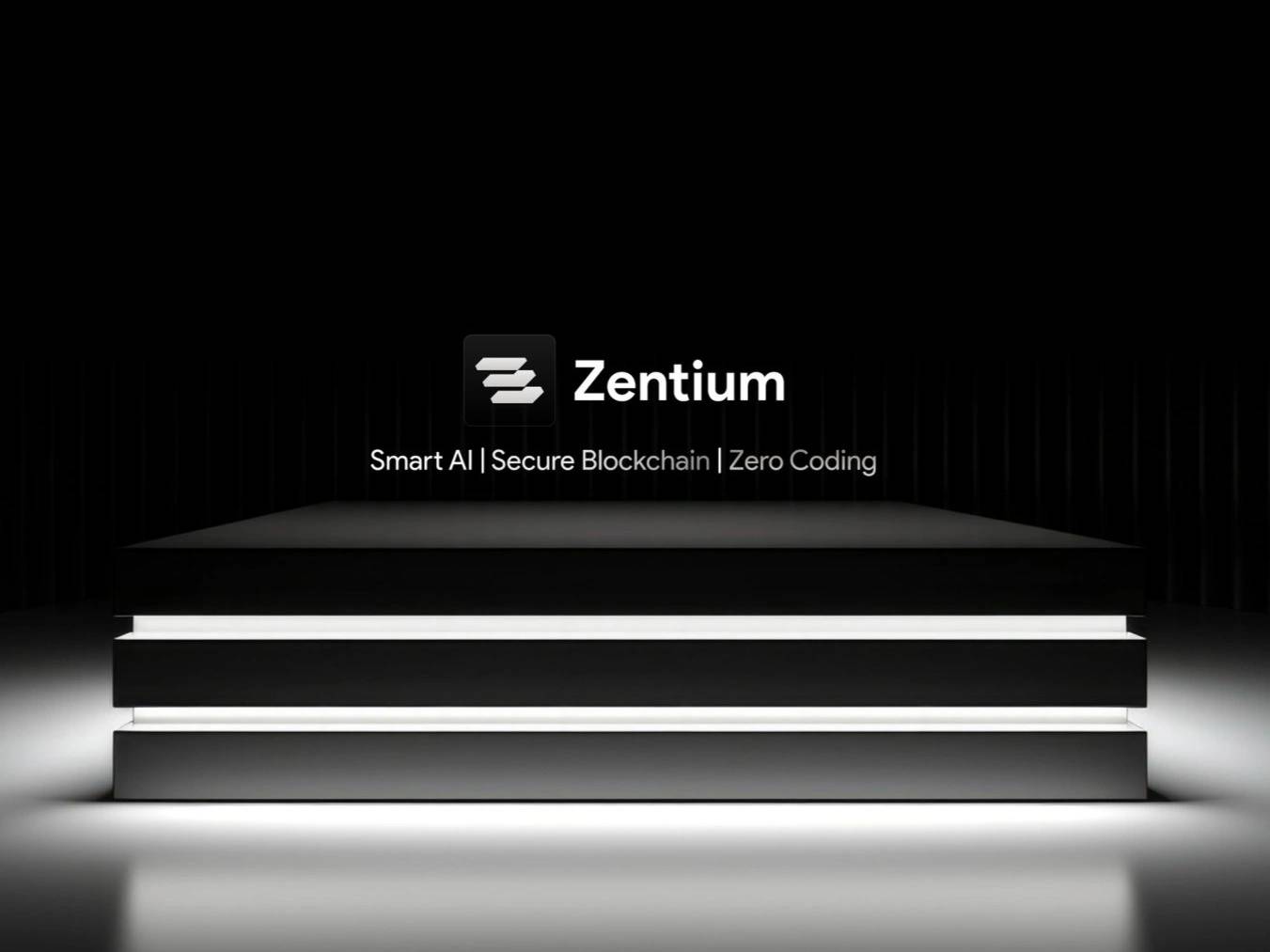订阅 wiki
Share wiki
Bookmark
Zentium
0%
Zentium
Zentium 是一个由人工智能驱动的 区块链 平台,旨在促进 人工智能代理 和应用程序的部署,而无需大量的编码知识。它的目标是将人工智能能力直接集成到 区块链 操作、智能合约 和 去中心化应用程序 中。 [1]
概述
Zentium 是一个人工智能驱动的 区块链 平台,旨在为各种背景的用户实现 人工智能代理 和 智能合约 的无代码部署。其 智能合约 结合了人工智能来分析实时数据、调整行动并自动化交易、安全和治理等领域的流程。该平台具有自主 人工智能代理,可以持续监控并响应不断变化的条件,从而提高效率和安全性。Zentium 还运营 ZentCloud,这是一个去中心化的人工智能计算网络,可在用户之间分配处理能力,从而保护数据隐私和透明度。其奖励系统,智能证明(PoI),根据参与者的人工智能贡献价值而非原始计算能力来补偿参与者。此外,Zentium 通过智能 DAO 将人工智能集成到去中心化治理中,从而增强提案分析和投票,以促进更明智和更具弹性的决策。 [3]
功能
Zentium区块链
Zentium区块链是一个将人工智能与去中心化应用程序集成的平台,专注于可扩展性、安全性和可访问性。其人工智能驱动的智能合约根据实时数据、机器学习和预测分析动态调整,以提高效率并自动响应。该平台提供开发工具,包括API、SDK和命令行界面,以简化应用程序开发,而不会引入额外的复杂性。在安全且可扩展的基础设施的支持下,Zentium可适应各种用例,包括人工智能自动化、去中心化金融和企业解决方案。该网络利用$ZENT代币来促进交易并确保去中心化运营。[4]
ZentBuilder

ZentBuilder 是一个无需代码的平台,使用户能够在 Zentium 上创建、配置和部署 AI 代理 和 智能合约,而无需编码。它具有一个拖放界面,用于组装处理自动化、数据分析和自然语言处理的 AI 逻辑块。该平台提供了一个直观的部署界面,方便从设计到执行的无缝过渡,并支持 AI 行为、机器学习算法以及与 智能合约 的交互的定制。预构建的 智能合约 模板支持 DeFi 自动化和 NFT 铸造 等用例,从而减少开发时间和成本。用户可以设置执行参数、定义权限和控制数据隐私。AI 代理 可以在 主网 上部署之前在 测试网 上进行测试,在那里它们可以实时数据运行并直接与链上资源交互。ZentBuilder 将 AI 驱动的应用程序开发简化为开发人员和非开发人员都可访问的统一工作流程。 [5]
ZentDex

ZentDex是Zentium生态系统中的一个去中心化交易所,它实现了安全、透明的链上交易,无需中介。它包含一个DEX聚合器,从多个去中心化交易所获取流动性,优化交易价格,减少滑点,并改善执行。该平台还集成了人工智能驱动的交易策略,分析实时市场数据,以支持更明智和精确的交易决策。这种组合旨在提高交易效率,并为用户提供有竞争力的定价和更大的控制权。 [6]
ZentMart

ZentMart是Zentium内的去中心化市场,促进开发者、研究人员和企业之间AI模型、数据集和专业服务的交换。它使创作者能够通过出售、出租或授权来将其AI资源货币化,从而扩大对高级工具的访问。研究人员可以贡献数据集以支持机器学习的进步,而企业可以获得根据其特定需求量身定制的AI解决方案。该平台支持使用Zentium原生$ZENT代币的代币化访问,允许用户安全透明地购买或租赁AI技术和数据。 [7]
ZentBridge
ZentBridge 是一个跨链桥,连接 Zentium 与主要的区块链,包括以太坊和币安智能链,促进代币和数字资产的无缝转移。它消除了网络之间的常见障碍,以确保快速、高效的资产转移,支持交易者、开发者和企业访问去中心化金融,执行跨链交易和集成资产。通过实现跨多个区块链生态系统的互操作性,ZentBridge 允许用户和项目在不同的平台上灵活操作,而不是局限于单个链。 [8]
ZentNode
ZentNode提供了一系列工具,旨在通过简化区块链参与,精简节点部署,促进跨链验证,实现节点租赁,并通过人工智能驱动的管理来提高性能。 [9]
众筹跨链节点
众筹跨链验证节点使用户能够通过汇集资源集体参与保护多个区块链,从而降低了单独运行节点的成本和技术障碍。参与者出资在节点上进行质押,这些节点验证跨多个网络的交易,Zentium 促进了多样化的跨链参与。权益根据每个用户的贡献和选择的区块链自动分配。主要功能包括支持多个网络(如以太坊和Solana),以及共享质押池,使用户无需管理完整节点即可参与。 [9]
无代码节点
ZentNode的无代码节点功能简化了区块链 节点部署,允许没有技术专长的用户轻松参与。它提供了一个用户友好的仪表板,包含逐步指导,支持各种网络和节点类型,如验证器和完整节点,并自动配置以优化性能和安全性。该服务采用订阅模式,提供灵活的计划和全面的管理工具,包括性能监控和自动警报。部署过程包括选择网络和节点类型,选择订阅,然后单击一下即可启动设置。之后,平台会自动处理配置和配置。 [9]
Nodemart
Nodemart 是一个连接 node 所有者和用户的市场,允许列出、发现和租赁 blockchain nodes。 Node 所有者提供位置、正常运行时间、费用和支持的网络等详细信息,以帮助用户评估选项。 用户可以按网络、类型和价格搜索和过滤节点,然后租用 nodes 以用于设定的时间段或特定用途,从而无需拥有或管理完整的基础设施即可参与。 [9]
NodesAI
NodesAI 利用人工智能来优化节点管理,通过实时监控关键性能指标,包括正常运行时间、处理能力和交易吞吐量。它采用机器学习进行预测分析,以识别和解决潜在问题。该系统还自动执行资源分配和配置调整,以优化效率。这种人工智能驱动的方法提高了网络稳定性,减少了维护需求,并提高了整体可靠性。 [9]
ZentBandwidth
ZentBandwidth提供了一个管理网络资源的系统,以支持Zentium上的AI应用。用户可以质押代币来获得优先带宽访问权,从而减少延迟并确保一致的性能。带宽根据需求动态分配,防止拥塞并优化资源使用。这种方法通过最大限度地降低网络速度减慢和中断的风险,为开发者和企业提供可靠的AI驱动应用程序执行方案。 [10]
ZentCloud
ZentCloud是一个去中心化的云计算系统,它支持AI模型在链上执行,从而消除了对中心化服务器的依赖。它使用分布式计算资源网络来支持可扩展的AI工作负载,允许开发者运行复杂的模型、分配任务,并在不同的需求下保持性能。ZentCloud支持AI驱动的dApps、大规模数据处理和机器学习操作等应用,提供了一个灵活可靠的计算基础设施,消除了传统中心化系统的局限性。 [11]
技术
Zentium的技术侧重于互操作性、人工智能集成、无代码开发和智能治理。通过ZentBridge,它连接到多个区块链网络,包括以太坊和币安智能链,实现代币、NFT和数据的无缝跨链传输。该平台支持具有强大隐私保护的链上AI代理执行,使用ZentCloud进行去中心化AI推理,从而保护敏感信息。ZentBuilder提供了一个无代码、拖放界面,用于创建AI驱动的应用程序,使非技术用户也能进行开发。此外,Zentium还具有智能DAO(IDAO),其中AI通过分析数据、预测趋势、减少偏差和优化投票流程来增强去中心化治理,同时保留用户控制。[2]
ZENT
ZENT是Zentium的原生资产。总供应量为1000万。 [12]
发现错误了吗?
